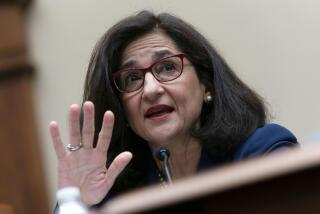Harvard President Says He Will Leave Next Year
- Share via
CAMBRIDGE, Mass. — Harvard University President Neil L. Rudenstine announced Monday that he would conclude his tenure as head of the country’s oldest institution of higher learning at the end of the 2000-01 academic year.
His 10-year term as Harvard’s president was marked by a fund-raising campaign that amassed $2.6 billion--the most successful university fund-raising effort in history. Under Rudenstine, the school’s endowment also soared from $4.7 billion in 1991 to more than $15 billion today.
His extraordinary fund-raising talents, said Jeremy Knowles, dean of Harvard’s faculty of arts and sciences, stem from a combination of warmheartedness, curiosity about people and powerful articulateness. “If you couple all those qualities with a compelling intellectual argument, then you may open your wallet,” Knowles said.
But focusing on Rudenstine’s financial success for Harvard sells the 65-year-old Renaissance literature expert short, said historian Henry Rosovsky, Harvard’s former acting president. Because of Rudenstine, Rosovsky said, the school’s faculty is stronger than ever. Rudenstine also has taken great care in appointing eight of the school’s nine faculty deans, Rosovsky said.
“These are lasting achievements,” he said. “They are what the university is all about.”
Stan Ikenberry, president of the American Council on Education in Washington, said the biggest challenge Rudenstine faced was “taking over the best-known, the most eagerly sought after university in the world and making it better.”
Rudenstine pursued that goal by placing a priority on collaboration at the large, disparate institution--which was founded 16 years after the Pilgrims arrived in Plymouth. Relying on his deans to help weigh institutional policy, Rudenstine steered Harvard toward interdisciplinary academic endeavors.
Early in his tenure, for example, he launched the Mind/Brain/Behavior Initiative, bringing faculty members from across the school together to pursue research.
“His whole idea was to make Harvard greater than the sum of its parts. For Harvard, that was new,” said UCLA Chancellor Al Carnesale, who served under Rudenstine as provost at Harvard.
Rudenstine said Monday that he picked this time to announce his departure because “we had an intense couple of years when I came to make an agenda for the decade. We’ve pretty well played out that agenda. We really did achieve a lot of the goals we set out to achieve. And I think it’s time now for the institution not to lose momentum, not to skip a beat. It means setting up a new agenda, and that means a new person.”
Rudenstine said he has not yet decided what he will do after he leaves Harvard. But, he noted, “I’m not a person who will easily sit around.”






